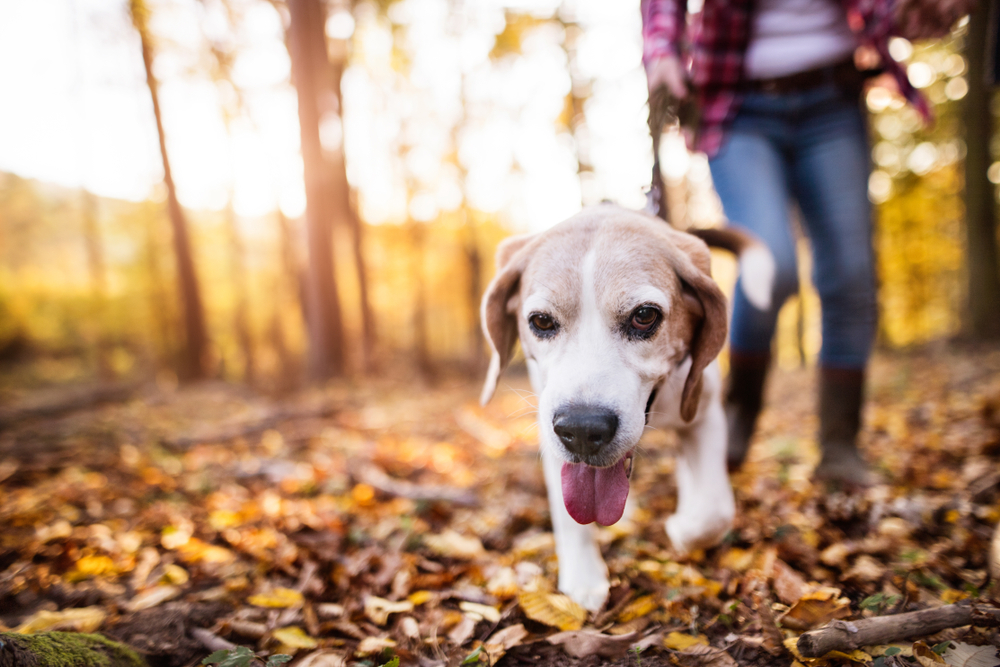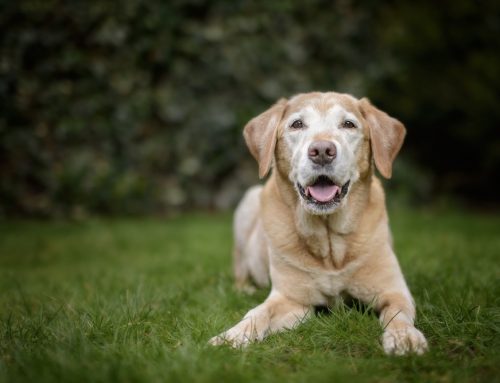“Dogs’ lives are too short. Their only fault, really.”
—Agnes Sligh Turnbull
Seemingly in the blink of an eye, cuddly puppies who need a lot of attention become graying seniors who need a lot of support. Caring for an elderly dog is similar to caring for a puppy—both take special attention, protection, and a lot of patience. Aging can affect a dog’s behavior, causing them to “forget” their house training, wake frequently during the night, or fail to recognize familiar places and people.
Watching a beloved companion face these challenges is difficult. Star of Texas Veterinary Hospital will help you understand the causes of behavior changes in senior pets, and how to help your aging pet feel confident and secure.
The aging dog—seeing the whole picture
Owners rarely report changes in senior pet behavior to their veterinarian, dismissing the signs as “old age,” and presuming nothing can be done. However, aging is not a disease, but a life process. While aging causes progressive and irreversible changes to the body, these changes are no reason to reduce your pet’s care.
Instead, a senior dog’s behavior changes (e.g., urinating in the house, or standing in the corner) should be seen as an indication of something internal, and discussed as part of your dog’s regular veterinary exam. Diseases and conditions that can alter an aging dog’s behavior include:
- Pain — Most often musculoskeletal, neurologic, or gastrointestinal
- Sensory deficits — Age-related vision or hearing loss
- Endocrine diseases — Thyroid, adrenal disease, or diabetes
- Liver or kidney failure — Toxin accumulation that can produce personality changes
- Central nervous system disorders — Cognitive decline, brain tumors, and seizures
- Circulatory system disorders — Anemia and high blood pressure
If a medical assessment and lab work have ruled out these conditions and diseases, or your veterinarian suspects another concurrent reason for your dog’s altered behavior, they may diagnose your dog with cognitive dysfunction syndrome (CDS).
What is canine cognitive dysfunction syndrome?
CDS is a progressive, age-related brain disorder that causes impairment of memory, awareness, and learning in senior dogs and cats. CDS is similar to early stages of Alzheimer’s disease in humans in its presentation and behavioral signs. As with people, not all senior dogs develop CDS.
The onset of CDS signs may be gradual, but because owners often mistake early CDS as “senior moments,” the change may seem sudden when something significant, such as house soiling, begins to occur regularly. Veterinarians use the acronym DISHAA to summarize the clinical signs of cognitive dysfunction syndrome.
- D = Disorientation — Dogs may stand at the wrong side of a door, appear lost in familiar places, or pace or walk in circles.
- I = Interaction — Pets may alter their social behavior, such as isolating themselves, seeking attention, or being unable to recognize familiar people.
- S = Sleep-wake cycles — Referred to as “sundowning” in people, dogs will be restless at night and sleep during the day.
- H = House soiling — Senior dogs may seem to “forget” their house training and eliminate indoors, sometimes right after being outside, or in front of their owners.
- A = Activity level changes — Pets may have Increased or decreased energy levels.
- A= Anxiety level changes — Formerly confident dogs may become anxious.
Watching your best friend struggle is heartbreaking, but remember to practice patience with your dog. If they respond inappropriately to your interactions, they are likely scared and confused, and reacting out of self-protective instincts. Never punish or discipline your senior dog with CDS.
Help for dogs with CDS
Cognitive dysfunction syndrome cannot be cured, but options are available to slow the progression.
- Medication — The drug selegiline may improve CDS clinical signs by increasing dopamine and neurotransmitter production in the brain.
- Supplements — Cognitive health supplements for dogs contain antioxidants, fatty acids, vitamin E, and ginkgo biloba.
- Diet — Veterinary and over-the-counter diets for brain health include medium chain triglycerides, antioxidants, and amino acids.
Fight back with canine enrichment
The best way to slow the progression of cognitive dysfunction is to ensure your dog is active and mentally engaged. Consider your dog’s physical and mental ability, and plan activities that keep them comfortable, safe, and successful. Most importantly, enjoy spending time together. Our 360° care program is a great resource for enrichment ideas, but here are some beginner suggestions:

- Simple tricks — if your dog is physically able, give familiar instructions such as “Sit,” “Down,” “Shake,” or “High five.” Ask in new spaces—the dining room, the bathroom, or the front porch—a slight change in environment makes your dog think.
- Snuffle mats and puzzle feeders — Available pre-made or DIY, these are great ways to encourage your dog to think for their food.
- Sniffing — Dogs experience the world through sniffing. Walk your dog or let them ride in a pet stroller. Walks are about mental as well as physical exercise. Allow your dog to take their time.
- Variety — Introduce one new thing to your dog every day. Let them investigate a coconut, a new toy, a smelly treat, or a few small cardboard boxes with their kibble inside. It does not have to be much, it simply has to make them think.
CDS does not happen to all senior dogs, but providing your dog with a rich, active, and engaged life mentally and physically is their best chance of delaying cognitive dysfunction onset and severity. One thing is for certain—you and your dog will never forget the extra time you spend together. Are you seeing changes in your senior dog’s behavior? Call Star of Texas Veterinary Hospital to schedule a medical assessment.







